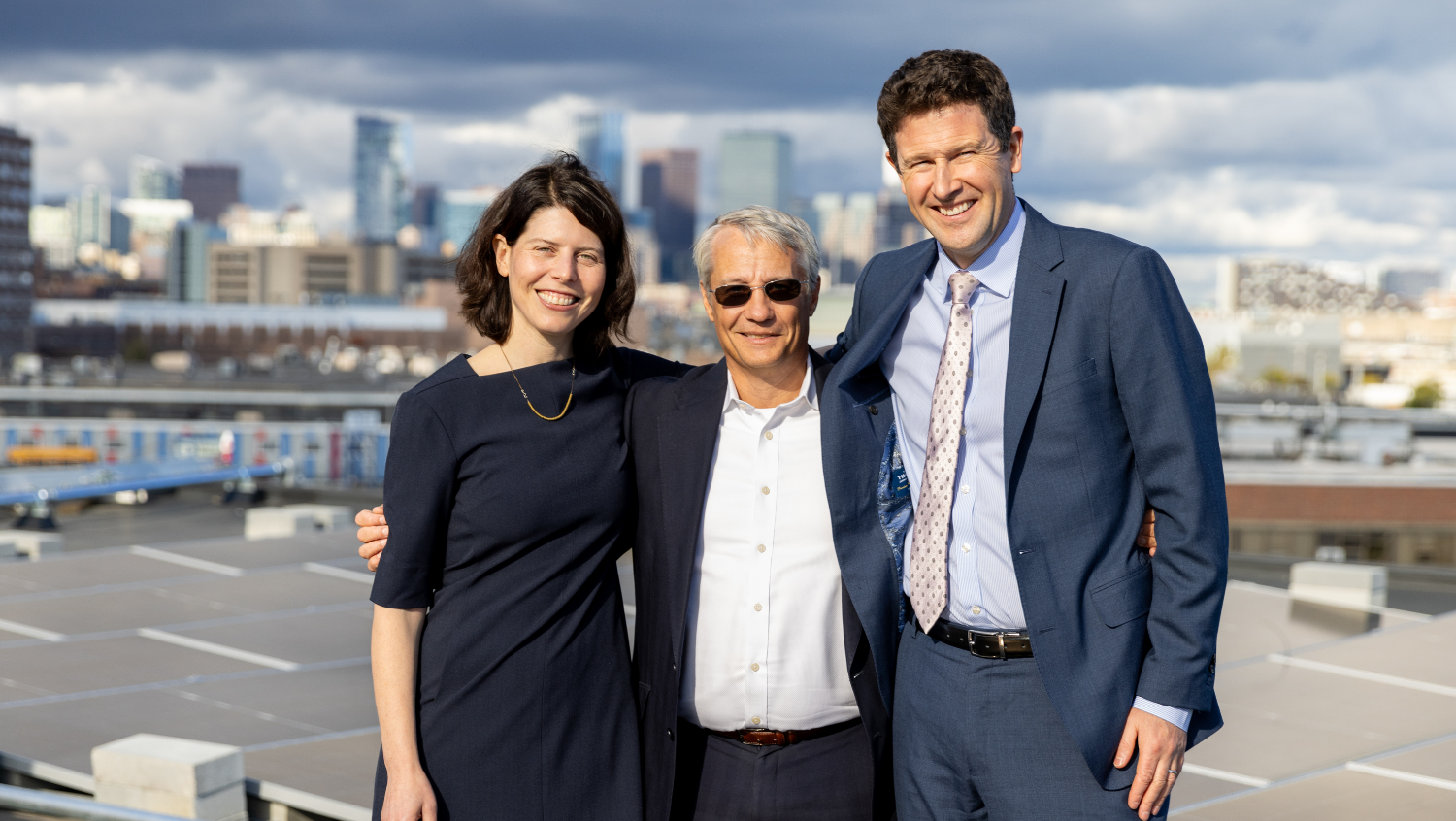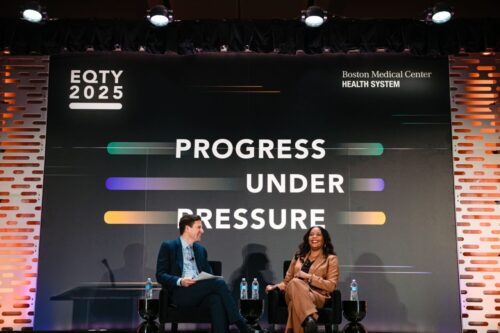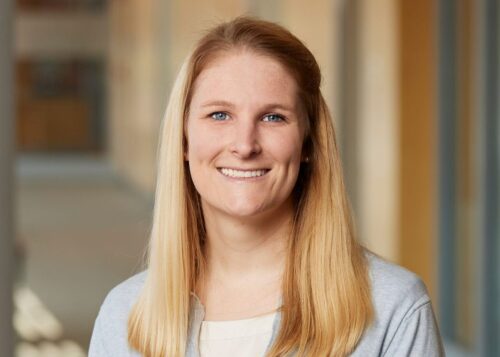Boston Medical Center Health System’s New Pilot Program Will Allow Doctors to Prescribe Energy Bill Credits for Patients
October 16, 2023
By Katie Dillon

Jeff Fernandes, Boston Medical Center
Anna Goldman, MD, MPA, MPH, Bob Biggio, Alastair Bell, MD, MBA in front of the solar panels on the roof 960 Massachusetts Avenue, which will be used in Clean Power Prescription program (Photo Credit: Boston Medical Center).
Boston Medical Center Health System’s first-in-the-nation Clean Power Prescription pilot builds on the health systems' sustainability practices, as well as its commitment to community investments.
This summer was one of the hottest on record globally. The northeastern U.S. and Canada were engulfed in wildfire smoke that trapped millions in their homes, and here in Massachusetts, residents saw the second-highest rain-soaked summer in recorded history and higher-than-usual incidences of tornadoes, hurricanes, and tropical storms. In other words, climate change is here.
Physical health concerns with a direct link to climate change — like asthma, cardiovascular disease and, now, dementia — have also been on the rise, especially in formerly red-lined neighborhoods. Boston is no different with Roxbury, Mattapan, and Dorchester leading the city in rates of asthma. Because many of the historical racial inequities perpetuated by red-lining are still at play today, it is unsurprising that these are also neighborhoods with the highest concentrations of poverty in the city. These are neighborhoods where there is often a high risk of utility shutoffs, forcing people to live at uncomfortable temperatures. This often exacerbates underlying or presenting medical conditions and traps people in cycles of poverty.
“It is critical for all people to live at a comfortable temperature,” says Anna Goldman, MD, MPA, MPH, a primary care physician at Boston Medical Center. “For example, if you are a person on diuretics, it is essential that you stay cool in hot temperatures, as you’re more prone to dehydration. We’re already seeing this cycle get worse as climate change progresses. Being comfortable at home—not too hot or too cold—is a basic human need and supports improved health.”
Setting the stage for a clean energy revolution
One short-term solution to this cycle is a Massachusetts state law that gives medical doctors, nurse practitioners, and physicians assistants the authority to write a letter to a person’s utility company highlighting a medical condition that necessitates the need for keeping on utilities. Goldman herself has written many of these letters.
“When people come to me asking for that letter, I know things have gotten dire,” she says. “Utilities and rent are usually the first bills people pay, so once someone comes to me with this problem, I know someone’s social needs are critical.”

A close-up shot of the solar panels on the roof at 960 Massachusetts Avenue. (Photo credit: Boston Medical Center)
But, Goldman says, this is a short-term solution for a long-term problem: Our global reliance on fossil fuels for energy is the largest contributor to climate change. We can recycle, bring our tote bags to the grocery store, bring a reusable tumbler to the local coffeeshop, and take public transit to reduce our personal carbon footprint — but to make a dent in the catastrophic effects of fossil fuels on our climate, we need overarching policy change.
The silver lining is there has been some major progress on this front: both the federal government, with the Inflation Reduction Act (IRA) of 2022 and the Commonwealth of Massachusetts with its Solar Massachusetts Renewable Target (SMART) program, provide major financial incentives to individuals and companies who use solar power for their energy
Clean Power Prescription is born
It is here — at the intersection of clean energy policy and her experience as a physician at a safety net hospital — where Goldman had an idea. She wanted to leverage these incentives from the federal and state governments to use solar energy from BMC Health System and redirect that energy to patients to support their health needs. The IRA in particular, provides a “boost of up to 20 percentage points to the investment tax credit for solar and wind energy projects in low-income communities.”
For this idea she needed buy-in from Boston Medical Center Health System’s (BMCHS) Chief Sustainability and Real Estate Officer Bob Biggio. Under Biggio’s leadership, BMCHS is already leading the region as one of the greenest hospitals in New England, with several initiatives, including its rooftop farm, its net-zero Behavioral Health Center in Brockton, its high-efficiency natural gas Cogeneration Power Plant, and its already-present commitment to solar energy.
“We’re already almost 100% carbon neutral for our energy use at BMC,” says Biggio, “so I felt very comfortable saying that we could do this, and using our resources in this way directly aligns with our mission.”
And so, in less than a year, Goldman’s idea, with active support from Biggio and partner organization Eversource Energy, became the Clean Power Prescription program — a first-in-the-nation pilot program that will enable BMCHS physicians to write patients a prescription for a reduced utility bill through renewable energy.
The way the program works is relatively simple, Biggio explains. Through a process called “virtual net metering,” the owner of a solar array — in this case BMCHS — can allocate a percentage of energy credits to a set group of alternate locations. In this case, those alternate locations are homes of BMCHS patients through a reduction in their energy bill.
The pilot will start with 80 households of existing patients in BMCHS’s Complex Care Management program. They will each received receive monthly credits averaging $50 per month, for a total of roughly $600 in savings per household per year. That represents a reduction of approximately 30% off the cost of the average Bostonian’s annual electrical bill. This is the first time a health system has used such offsets to help improve the economic and environmental health of its patients.
Looking to the future of clean energy in Boston
But the hope is for other businesses and groups in the Boston area to participate in Clean Power Prescription and donate their own energy credits from renewable energy sources to BMCHS patients.
“Other people — other real estate holders — should really think about doing this as well,” says Biggio. “Not only are there are federal and state incentives that would help them financially, but it’s a great way to give back to people who need it while also helping the future of our Earth.”
For Goldman, this project has been a combination of passions: the idea of helping offset financial costs to patients who need it the most, and it makes her feel invigorated, like she’s also doing something in the face of climate change. “We have no time to waste in getting to net-zero,” she says, ” This is a chance for BMCHS to showcase what health systems can do to not only give back to our communities, but lead the charge on a renewable future.”


